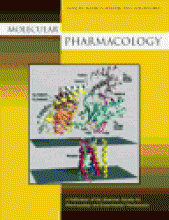Abstract
We recently described that melatonin and some kynurenines modulate theN-methyl-d-aspartate-dependent excitatory response in rat striatal neurons, an effect that could be related to their inhibition of nNOS. In this report, we studied the effect of melatonin and these kynurenines on nNOS activity in both rat striatal homogenate and purified rat brain nNOS. In homogenates of rat striatum, melatonin inhibits nNOS activity, whereas synthetic kynurenines act in a structure-related manner. Kynurenines carrying an NH2group in their benzenic ring (NH2-kynurenines) inhibit nNOS activity more strongly than melatonin itself. However, kynurenines lacking the NH2 group or with this group blocked do not affect enzyme activity. Kinetic analysis shows that melatonin and NH2-kynurenines behave as noncompetitive inhibitors of nNOS. Using purified rat brain nNOS, we show that the inhibitory effect of melatonin and NH2-kynurenines on the enzyme activity diminishes with increasing amounts of calmodulin in the incubation medium. However, changes in other nNOS cofactors such as FAD or H4-biopterin, do not modify the drugs' response. These data suggest that calmodulin may be involved in the nNOS inhibition by these compounds. Studies with urea-polyacrylamide gel electrophoresis further support an interaction between melatonin and NH2-kynurenines, but not kynurenines lacking the NH2 group, with Ca2+-calmodulin yielding Ca2+-calmodulin-drug complexes that prevent nNOS activation. The results show that calmodulin is a target involved in the intracellular effects of melatonin and some melatonin-related kynurenines that may account, at least in part, for the neuroprotective properties of these compounds.
Footnotes
- Received March 15, 2000.
- Accepted July 10, 2000.
-
Send reprint requests to: Dr. D. Acuña-Castroviejo, Departamento de Fisiologı́a, Facultad de Medicina, Avda. de Madrid, 11, E-18012 Granada, Spain. E-mail:dacuna{at}goliat.ugr.es
-
This work was partially supported by grants from the Ministerio de Educación y Cultura (SAF98-0156), and from the Junta de Andalucı́a (CTS-101). J.L. and Ma.M. are a fellows from the Programa de Formación de Personal Investigador, Ministerio de Educación y Cultura, Spain; H.K. is a fellow from the Ministerio de Asuntos Exteriores, Spain; Mi.M. is a fellow from the Universidad de Granada.
- The American Society for Pharmacology and Experimental Therapeutics
MolPharm articles become freely available 12 months after publication, and remain freely available for 5 years.Non-open access articles that fall outside this five year window are available only to institutional subscribers and current ASPET members, or through the article purchase feature at the bottom of the page.
|






